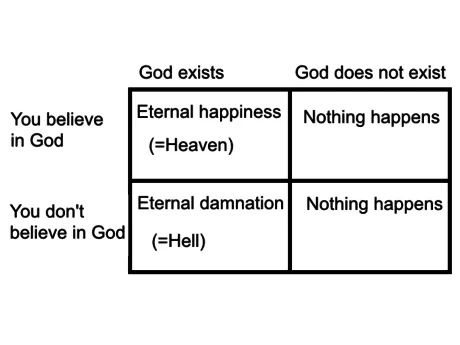Introduction
In the realm of decision-making, Pascal’s Wager presents an intriguing mental model. It involves making choices based on potential rewards and punishments, particularly in matters of faith or belief. Anchored in human psychology, Pascal’s Wager finds prevalence in our day-to-day lives, often leading individuals or groups to make irrational decisions contrary to their best interests. Understanding the implications of Pascal’s Wager is crucial for making informed choices and avoiding the pitfalls of simplistic decision-making. In this comprehensive blog post, we will explore the concept of Pascal’s Wager, provide examples across various contexts, delve into the biases that contribute to it, offer practical advice on identifying and avoiding this fallacy, and emphasize the value of awareness and active avoidance of this mental trap.
Defining Pascal’s Wager and Its Relevance in Decision-Making
Pascal’s Wager is a mental model named after the 17th-century philosopher Blaise Pascal. It suggests that when faced with uncertain outcomes, it is rational to believe in God or adopt religious practices because the potential reward (eternal salvation) outweighs the potential cost (missing out on salvation). This model extends beyond religious belief and can be applied to various decision-making scenarios where potential outcomes involve significant stakes.
Examples of Pascal’s Wager in Various Contexts
- Personal Life Decisions: Consider an individual who decides to pursue a particular career path solely because it promises financial security, even though it lacks personal fulfillment or aligning values. By prioritizing the potential monetary reward, they overlook other important aspects of job satisfaction, leading to long-term dissatisfaction and unfulfilled potential.
- Business Scenarios: In business, Pascal’s Wager can manifest when companies adopt unethical practices to maximize short-term profits. By focusing solely on potential gains, they ignore the potential long-term consequences, such as damage to reputation, loss of customer trust, or legal repercussions. This short-sighted approach can ultimately harm the company’s sustainability and bottom line.
- Public Policy-Making: Pascal’s Wager can influence public policy-making when policymakers prioritize popular decisions over evidence-based approaches. Instead of thoroughly evaluating the potential benefits and drawbacks of a policy, they may choose the path that appears politically advantageous in the short term, disregarding the long-term implications and potential harm to society.
Mental Biases and Psychological Underpinnings
Pascal’s Wager is influenced by several cognitive biases. The first is the availability heuristic, where individuals prioritize easily accessible information when making judgments or decisions. In the context of Pascal’s Wager, individuals might be swayed by vivid stories or anecdotes that emphasize the potential rewards or punishments, without considering a broader range of possibilities.
Another bias at play is the confirmation bias, where people tend to seek or interpret information in a way that confirms their preexisting beliefs or desires. Individuals may selectively focus on evidence supporting the potential reward or punishment they desire, while disregarding contradictory evidence. This bias can reinforce simplistic decision-making based on Pascal’s Wager.
Additionally, the affect heuristic can influence decision-making in Pascal’s Wager. Emotions play a significant role in shaping our choices, and when faced with uncertain outcomes, individuals may be more likely to make decisions based on the emotional impact of potential rewards or punishments rather than careful analysis.
Identifying and Avoiding Pascal’s Wager
To avoid succumbing to the limitations of Pascal’s Wager, consider the following strategies:
- Seek a comprehensive perspective: Engage in critical thinking and gather a wide range of information and viewpoints before making decisions. Consider the potential costs and benefits from multiple angles, weighing both short-term and long-term implications.
- Embrace uncertainty: Acknowledge that some decisions involve inherent uncertainty, and it is essential to make peace with the possibility of not having absolute certainty. Avoid making choices solely based on the potential rewards or punishments, but rather on a more balanced assessment of available information.
- Assess the evidence: Rely on evidence-based decision-making by seeking reliable data, conducting research, and consulting trusted sources. Avoid hasty conclusions driven by biases or superficial evaluations.
- Reflect on values and priorities: Consider the alignment of your decisions with your values, aspirations, and long-term goals. Assess the potential consequences beyond immediate rewards and punishments to ensure your choices align with your personal or organizational vision.
Conclusion
Pascal’s Wager serves as a cautionary tale in decision-making, reminding us of the dangers of simplistic approaches that prioritize potential rewards or punishments over a comprehensive evaluation of available information. By understanding the biases that contribute to Pascal’s Wager and actively avoiding this mental trap, we can make more informed choices that align with our values, goals, and long-term well-being. By embracing critical thinking, evidence-based decision-making, and a broader perspective, we can navigate complex decision-making scenarios more effectively, empowering ourselves to make choices that serve our best interests in personal, professional, and societal contexts.
